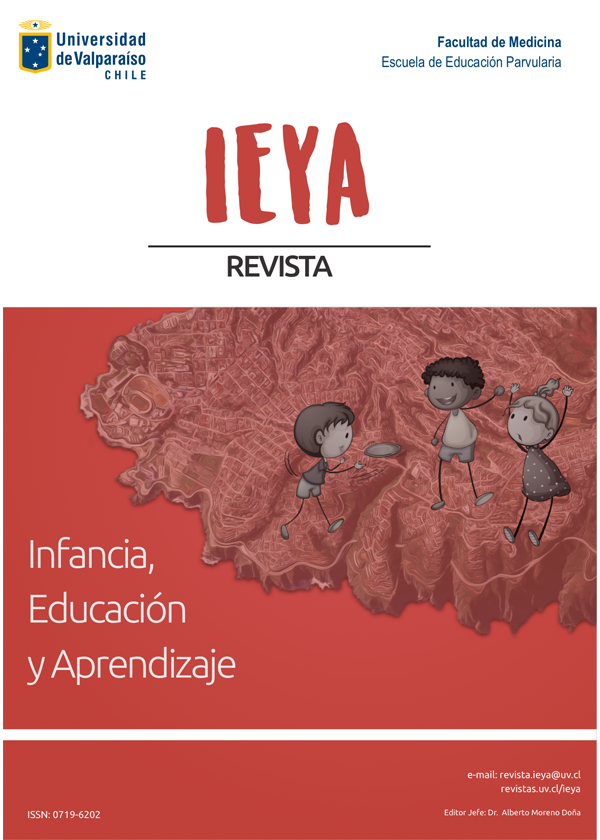PARENTING PRACTICES IN THE EDUCATIONAL WORK OF EARLY CHILDHOOD EDUCATORS
DOI:
https://doi.org/10.22370/ieya.2025.11.2.4772Keywords:
practice, parenting, trainers, childhoodAbstract
The research is aimed at understanding the languages of caregiving practices in the teaching work of undergraduate students in early childhood education. The study was conducted through qualitative research with a hermeneutic approach, which allowed for the characterization, identification, classification, and description of caregiving practices. The acquired knowledge contributes to reflection on teacher training processes, considering the effects derived from the experiences implicit in students of childhood education programs. It is found that caregiving practices have evolved from punitive and disciplinary approaches to more affective languages. However, participants acknowledge that the caregiving practices they received in their own childhood directly influence the ways they teach in their current practices.
Downloads
References
Ariès, P. (1973). L’enfant et la vie familiale sous l’Ancien Régime. Seuil.
Calvo, C., & Elizalde, A. (2010). Educación: creación de nuevas relaciones posibles. Polis. Revista Latinoamericana, (25), 1–17.
Calvo, M. C. (2014). Del mapa escolar al territorio educativo: disoñando la escuela desde la educación. Universidad de La Serena.
Código de la Infancia y la Adolescencia, Ley 1098 de 2006, Congreso de Colombia, 8 de noviembre de 2006.
Constitución Política de Colombia [Const.], Art. 44 (1991).
Convención sobre los Derechos del Niño. (2009). Convención sobre los derechos del niño (pp. 103–118). Litoimpreso Ltda.
Durán Solano, E., & Linares Escalona, J. L. (2021). Estilo de crianza: un modelo socioeducativo. Infometric@. Serie Sociales y Humanas, 8(1), 45–60.
Gómez, Z. P. (2007). El trabajo infantil en clave colonial: consideraciones histórico-antropológicas. Nómadas, (26), 80–90.
Izzedin Bouquet, R., & Pachajoa Londoño, A. (2009). Pautas, prácticas y creencias acerca de crianza ayer y hoy. Liberabit, 15(2), 109–115.
Kohan, W. O. (2024). Infancia. Entre educación y filosofía. Laertes.
Lara-Villanueva, R. S., & Zúñiga-Rodríguez, M. (2024). Las agentes educativas en el campo de la educación inicial y el desafío de su profesionalización actual. Revista Mexicana de Investigación e Intervención Educativa, 3(2), 18–25.
López Quille, P. V., & Nieves Sari, J. P. (2021). La influencia de los estilos de crianza en los problemas comportamentales en niños de 4 a 5 años [Tesis de licenciatura, Universidad del Azuay].
Matarranz, M. (2023). La dimensión de género en la profesionalización docente: Una revisión bibliográfica [Tesis de máster, Universidad Autónoma de Madrid].
Pacheco, F. D. R., & Salazar, V. G. P. (2020). Grupos focales: Marco de referencia para su implementación. INNOVA Research Journal, 5(3), 182–195.
Peirce, C. S. (1992). The fixation of belief. En N. Houser & C. Kloesel (Eds.), The essential Peirce: Selected philosophical writings (Vol. 1, 1867–1893, pp. 109–123). Indiana University Press.
Real Academia Española. (2001). Diccionario de la lengua española (22.ª ed.). Espasa.
Salgado, A. M. A., & López, L. J. M. (2024). Agentes educativos para la construcción de paz desde la primera infancia. Revista Internacional de Pedagogía e Innovación Educativa, 4(2), 171–188.
Sánchez López, C. I. (2018). Pautas y prácticas de crianza en Colombia: Análisis de investigaciones realizadas en la última década [Informe de investigación].
Sensat, R. (2018). Las razones de la feminización de la educación infantil. Associació de Mestres Rosa Sensat.
Published
How to Cite
Issue
Section
License
Copyright (c) 2025 Universidad de Valparaíso

This work is licensed under a Creative Commons Attribution 4.0 International License.
Los investigadores(as), académicos(as) y profesionales de la educación que envíen originales para su evaluación por IEYA deberán asegurarse que los artículos cumplen con las instrucciones a los autores(as).
La Revista IEYA y cada uno de sus artículos están licenciados por Creative Commons 3.0.
El proceso editorial completa no supone ningún costo económico para los autores(as).
La Revista IEYA proporcionará un DOI a cada artículo.
Por último mencionar que en pos de la transparencia del proceso de revisión doble ciego, cada autor(a) recibirá la evaluación realizada por los revisores externos, lógicamente sin conocer la persona(as) que han realizado dicha evaluación.



